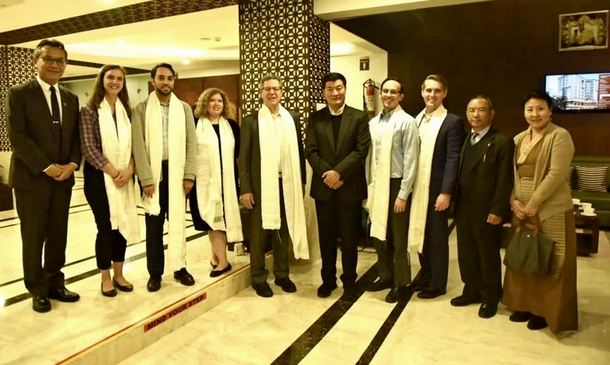Dharamshala, India — US Ambassador at large for International Religious Freedom, Samuel D. Brownback, who is on a two-day visit to India, on Monday met His Holiness the Dalai Lama and said that the role of picking a successor to the Dalai Lama belongs to the Tibetan Buddhist system alone.
During the two-day visit, which began on Sunday, the Ambassador met high-ranking officials of the Tibetan government in-Exile, officially known as the Central Tibetan Administration (CTA), including President Dr Lobsang Sangay who is the democratically elected leader of the Tibetan people.
The US Ambassador at large for International Religious Freedom, Samuel D. Brownback arrived in Dharamshala, India, the headquarters of the Tibetan government in exile, officially known as the Central Tibetan Administration, in the highest-level official visit led by the US Government to the CTA in the recent period.
Ambassador Samuel D. Brownback was officially invited by President Dr Lobsang Sangay as the chief guest for the First International Conference on Tibetan Performing Arts and the 60th-anniversary celebrations of the Tibetan Institute of Performing Arts (TIPA).
The Amb. was welcomed by Dr Lobsang Sangay, President of the CTA, accompanied by Secretary Tsewang Gyalpo Arya, Department of Information and International Relations, CTA Chief Resilience Officer and SARD Director Kelsang Dorjee Aukatsang, Dharamshala Settlement Officer and Tibetan representatives.
He is accompanied by three staffers from the US State Department’s Office of International Religious Freedom and two from the US Embassy in Delhi on this visit. They include Riley Miller Barnes, Razi Hashmi, Mariah Jane Mercer from the Office of International Religious Freedom and Michael Edward Rosenthal and Nicole Thiher from the US Embassy in Delhi.
Speaking exclusively to the Tibet News Bureau (TNB), the US Ambassador for International Religious Freedom said the purpose of his visit is to send a clear message that “the United States government supports the Tibetan people, the Dalai Lama and that the role of picking a successor to the Dalai Lama belongs to the Tibetan Buddhist system, the Dalai Lama and other Tibetan Buddhist leaders."
"It does not belong to anybody else, not any government or any entity. I want to express that clearly,” he said. “The US government supports the Dalai Lama and supports for the succession of the Dalai Lama to be done by the Tibetan Buddhist leadership.”
Prior to the meeting with President Dr Sangay, Amb Brownback met with a group of survivors of religious persecution who had recently escaped from Chinese-controlled Tibet. In the hourlong meeting, Ambassador asked questions to each of the survivors and listened intently as they shared their accounts.
He thanked them for their courage and expressed his full support and earnest efforts towards advancing religious freedom inside Tibet. “We believe in religious freedom; the United States strongly supports religious freedom. We believe people all over the world deserve this right and they should be able to practice their peacefully and freely," the Ambassador said.
"Unfortunately Tibetans aren’t allowed to practice their faith freely in Tibet and they have to get out to India and other places to practice their faith so I was hearing with some people that had recently left and all for the reason of wanting to practice their faith freely,” said the US Ambassador for Religious Freedom.
The Office of International Religious Freedom in the U.S. Department of State said it has the mission of promoting religious freedom as a core objective of U.S. foreign policy and monitors religious persecution and discrimination worldwide, recommend and implement policies in respective regions or countries, and develop programs to promote religious freedom.


![Tibet has a rich history as a sovereign nation until the 1950s when it was invaded by China. [Photo: File]](/images/stories/Pics-2024/March/Tibet-Nation-1940s.jpg#joomlaImage://local-images/stories/Pics-2024/March/Tibet-Nation-1940s.jpg?width=1489&height=878)
















